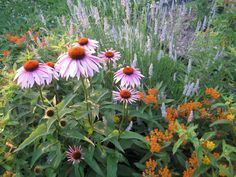In the last newsletter, we touched on native gardens. They’re so special, they deserve to have more of their incredible story told. These gardens that have plants that take a woody form (trees and bushes) or herbaceous form (flowers), are vital to the local ecosystem. The Met, because it believes in doing good things, will have what many gardeners strive for: an ecologically conscious garden.
Native gardens are part of the circle of life. They support an environmental web, where plants and creatures depend upon one another, none of them crowding the other out, but supporting each other. It really is a metaphor for our existence, isn’t it? All of us chipping in to sustain one another.
First, native plants help us humans because of their hardy nature. They’re perennial, meaning they’ll return year after year. This is good value! They also require little care. Once established, they require only water from rainfall—no fertilizer, no soil amendments and no pesticides, which are so lousy for the environment—and us.
Second, they support local wildlife. They offer more benefit in terms of shelter, nesting materials, nectar, pollen and seeds than non-native plants. The birds, bees and butterflies will thank us! Did you know that there are particular creatures that require one very specific food to live? For instance, the monarch butterfly needs milkweed for their larvae to survive. Without milkweed there would be no monarch butterflies. Of course, we’ll have milkweed in our garden! We’ll plant things that sustain the living things in our local region.
Third, we won’t have to disturb the soil, once we’re done planting. This is critical for the ecosystem that lives beneath the ground. Did you know that there are solitary bees, that would never hurt us, that live in cavities under the soil instead of in hives? These soil-dwelling bees are responsible for one-third of pollination!
Finally, native plants aren’t invasive, so they won’t overtake any of the other plants that naturally grow in this region. If plants are brought from elsewhere they can become invasive, crowding out native growth and deeply damaging our ecosystem.
So, there you have it: Growing native plants is one of the best things we can do for the environment—one garden at a time.








